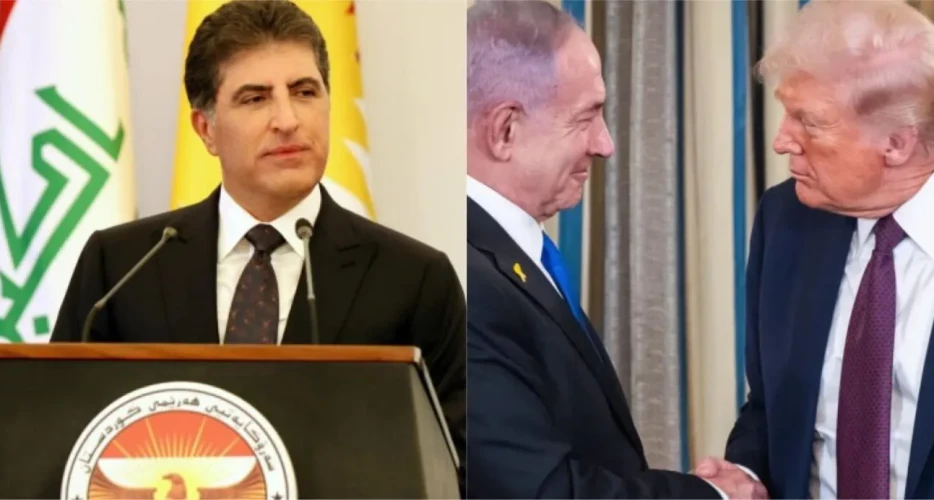Nechirvan Barzani Backs Trump’s Gaza Peace Proposal, Calls for Constructive Dialogue

Peregraf
Kurdistan Region President Nechirvan Barzani has expressed support for U.S. President Donald Trump’s newly announced Comprehensive Plan to End the Gaza Conflict.
In a statement posted on his official account on X, Barzani said, “I welcome President Donald Trump’s Comprehensive Plan to End the Gaza Conflict and commend his leadership.”
He urged all sides to approach the initiative with openness and responsibility. “I encourage all parties to engage constructively in dialogue and demonstrate the spirit of compromise in the interest of achieving lasting peace, security, and prosperity for the people of the region,” Barzani added.
Trump unveiled the proposal earlier this week, describing it as a roadmap for ending the cycle of violence and establishing a sustainable peace in the Middle East. The plan has already drawn international attention, with reactions ranging from cautious optimism to sharp criticism.
Barzani’s remarks highlight the Kurdistan Region’s continued support for dialogue and peaceful solutions in the broader Middle East, particularly in light of ongoing conflicts that have destabilized the region.
President Donald Trump emerged from talks with Israeli Prime Minister Benjamin Netanyahu on Monday declaring an end to the war in Gaza was closer than ever after Netanyahu agreed to a 20-point plan laying out the parameters of a ceasefire.
The proposal, which Trump unveiled publicly for the first time, still requires sign-off from Hamas. And there are a number of provisions contained in the plan which the group has previously rejected. Still, Trump appeared hopeful that after nearly two years of war, an end to the conflict – which has left tens of thousands dead and Gaza in ruins – may be at hand.
“I think we are beyond very close,” Trump said at the start of an appearance with Netanyahu in the White House State Dining Room. “We’re not quite finished. We have to get Hamas.”
The plan calls for the release of all remaining hostages held by Hamas – both alive and dead – within 72 hours of Israel publicly accepting the agreement, meaning the clock is already ticking for the group to agree. Both Trump and Netanyahu warned of sharp consequences if Hamas turns down the proposal.
“I hope that we’re going to have a deal for peace, and if Hamas rejects the deal, which is always possible - they’re the only one left, everyone else has accepted it - but I have a feeling that we’re going to have a positive answer,” Trump said during statements at the White House.
“If Hamas rejects your plan, Mr. President, or if they supposedly accept it and then do everything to counter it, then Israel will finish the job by itself,” Netanyahu said. “This can be done the easy way or it can be done the hard way, but it will be done.”
Trump said Israel would have his “full backing” to continue going after Hamas if the group rejects the deal. Neither man took questions at the conclusion of their appearance, saying it would be better to wait until the plan was finalized and agreed to by all parties.
While there has yet to be a response from Hamas, another Palestinian militant group, Islamic Jihad, condemned the Trump plan, warning it was a “recipe for regional explosion” and “continued aggression against the Palestinian people.”
The families forum, representing families of the hostages taken by Hamas in the October 7 attacks, urged the Israeli government to “move forward … toward completing this agreement,” saying it was “now or never.” The group has been openly critical of Netanyahu and accused him of “sabotage” and being an “obstacle” to ending the war.
An agreement to end the nearly two-year war in Gaza would amount to a major diplomatic victory for Trump, who has openly campaigned for a Nobel Peace Prize and has grown increasingly frustrated at his inability to end the war. It could also – in the view of American officials – unlock a broader plan that would transform the Middle East, potentially opening the door to expanding the Abraham Accords.
The proposal also outlines governance for Gaza after the conflict, calling for a “Board of Peace,” chaired by Trump, and a reformed Palestinian Authority to eventually take control. Netanyahu’s far-right allies have strongly opposed any role for the PA and threatened to collapse the Israeli government if such provisions are accepted.
Meanwhile, fighting has continued. Israel’s military campaign in Gaza City, described as one of Hamas’ last strongholds, has fueled international criticism. A recent UN inquiry concluded that Israel has committed genocide in Gaza, citing the deaths of more than 66,000 Palestinians, including over 17,000 children, since October 2023.
Whether Hamas accepts or rejects the Trump plan will determine the next phase of the conflict. For now, hope for peace is tempered by deep skepticism across the region.